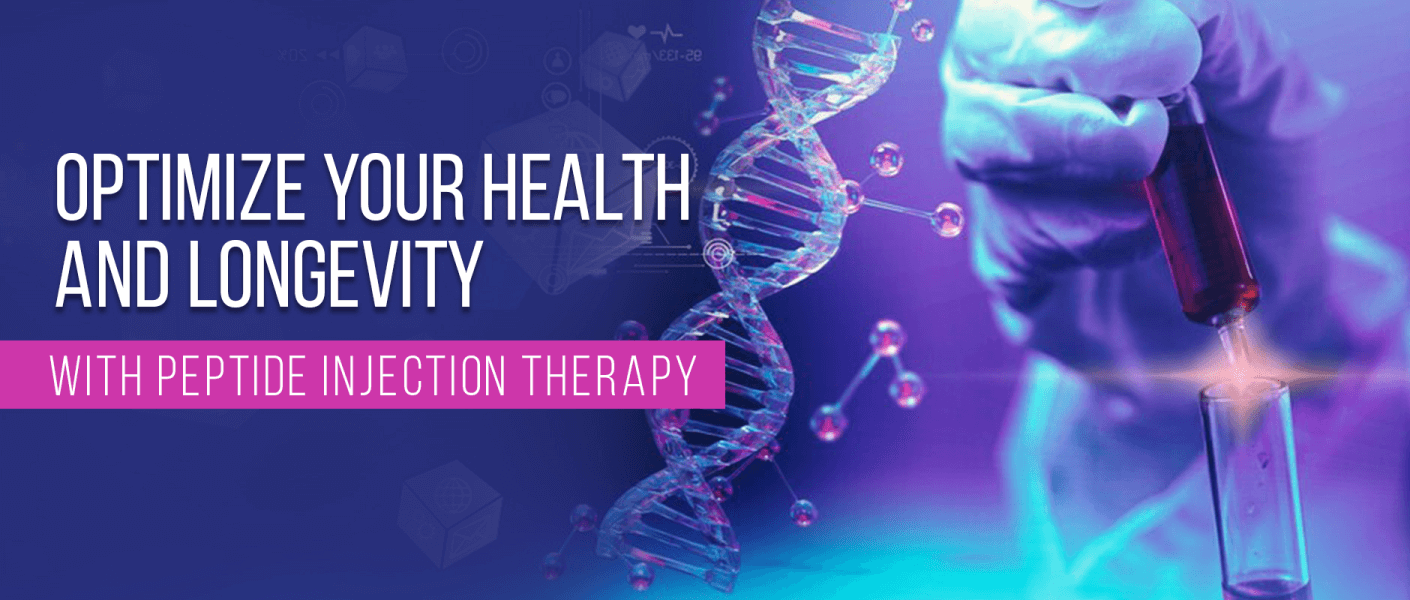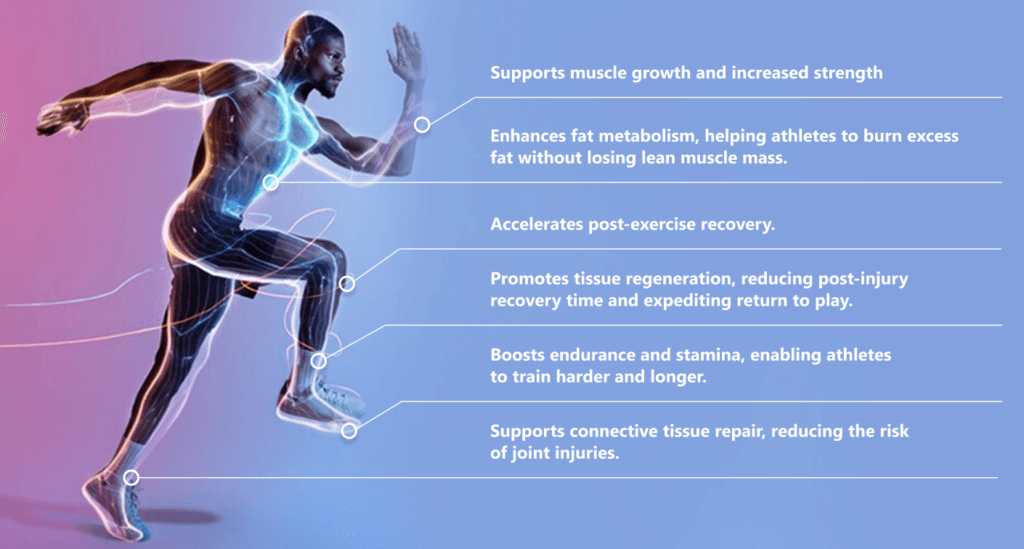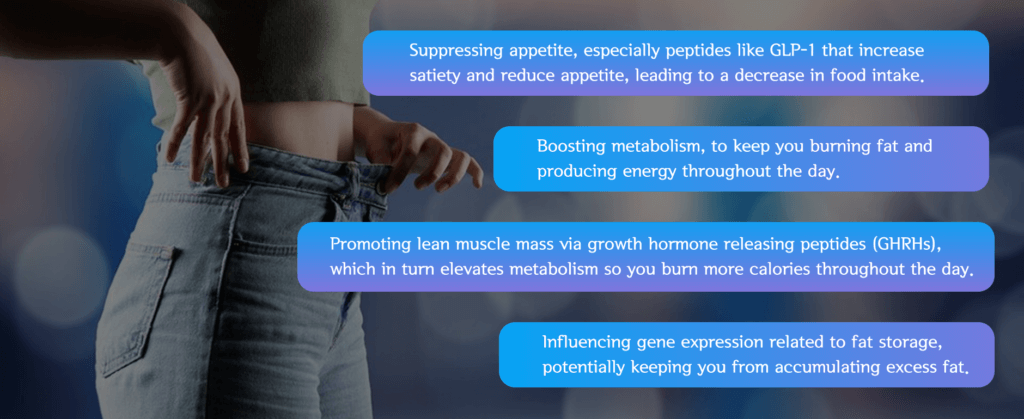 Peptides are short chains of amino acids that your body needs to support a broad range of biological functions and processes. Ideally, we would get ample amounts of peptides from our diets, but today’s modern lifestyles and erratic eating behaviors has left many people deficient, impacting their overall health.
Peptides are short chains of amino acids that your body needs to support a broad range of biological functions and processes. Ideally, we would get ample amounts of peptides from our diets, but today’s modern lifestyles and erratic eating behaviors has left many people deficient, impacting their overall health.
Learn about the role of peptides in human biology, which ones are most important for health, and how peptide therapy can help you make up for deficiencies and boost health, cognition, and physical performance.
What are Peptides and Where Do They Come From?
Peptides are short chains of about 2-50 amino acids, linked together by peptide bonds. Amino acids are the building blocks of protein, but peptides are shorter and less complex than proteins. Peptides act as signaling molecules in your body, regulating various processes like hormone production, immune function, and communication between cells. Some peptides you are probably familiar with include insulin, oxytocin, and collagen. Your body manufactures peptides by breaking down dietary proteins.
Foods that provide rich sources of bioavailable peptides include:
- Red meat
- Poultry
- Fish and seafood
- Eggs
- Dairy products
- Seaweed and algae
- Fermented foods like yogurt, kimchi and sauerkraut
Some plant sources also provide peptides, but in much smaller quantities. Vegans and vegetarians may become deficient unless they supplement, or eat large amounts of legumes, grains, nuts and seeds. Peptides are also produced synthetically, and used for therapeutics and targeted supplements. Synthetic peptides are generally less bioavailable than food-sourced peptides.
Health Benefits of Peptide Supplements
Peptide supplements are designed to target various physiological processes and functions, depending on their intended use and specific composition. When used for general health and wellness, peptide supplements help to optimize certain biological functions, such as tissue repair, hormone regulation, immune function, and metabolic processes.
Peptide supplementation can help to:
- Support muscle and connective tissue growth and repair via collagen peptides and growth hormone-releasing peptides.
- Boost skin elasticity, hydration, and collagen production.
- Accelerate wound healing.
- Promote weight loss by influencing fat metabolism, regulating appetite, and boosting energy expenditure.
- Support immune responses, to fight pathogens and infections.
- Enhance cognition and neurological health.
- Reinforce joint health by boosting cartilage repair, reducing inflammation, and improving bone density.
- Regulate hormones and improve hormonal balance.
Peptides typically work by binding to specific receptors on cell surfaces, triggering intracellular signaling cascades. They can also act as signaling molecules, and serve as precursors for proteins. Their exact mechanisms of action vary, depending on their specific roles in biological processes.
Peptides and Athletic Performance
Elite athletes are always looking for new ways to gain a competitive edge, and peptides provide a safe and natural way to optimize performance, accelerate recovery, and reap greater training gains. In the world of integrative sports medicine, peptides represent a holistic class of therapeutics that optimize training, metabolism, recovery, and tissue repair.
Advantages of peptide supplementation for athletes:
- Supports muscle growth and increased strength via Growth Hormone Releasing Peptides (GHRPs) and Insulin-like Growth Factor 1 (IGF-1), to stimulate growth hormone production that amplifies protein synthesis and muscle growth.
- Enhances fat metabolism, helping athletes to burn excess fat without losing lean muscle mass.
- Accelerates post-exercise recovery.
- Promotes tissue regeneration, reducing post-injury recovery time and expediting return to play.
- Boosts endurance and stamina, enabling athletes to train harder and longer.
- Supports connective tissue repair, reducing the risk of joint injuries.

Peptide Therapy for Weight Loss
Nutrients play a key role in weight management – it’s not enough to simply eat less, you have to eat better for your body to function at its best. In addition to supporting lean muscle and enhancing fat metabolism, peptides like glucagon-like peptide 1 (GLP-1) – the active agonist in diabetes medications like semaglutide –can help to regulate appetite, boost basal metabolism, and suppress insulin resistance.
Peptide therapy supports weight loss by:
- Suppressing appetite, especially peptides like GLP-1 that increase satiety and reduce appetite, leading to a decrease in food intake.
- Boosting metabolism, to keep you burning fat and producing energy throughout the day.
- Promoting lean muscle mass via growth hormone releasing peptides (GHRHs), which in turn elevates metabolism so you burn more calories throughout the day.
- Influencing gene expression related to fat storage, potentially keeping you from accumulating excess fat.

Peptides to Combat Aging
As people age, the body’s systems and processes become less efficient, especially if efforts are not made to optimize lifestyle behaviors. Supplementing with peptides can help to keep your biological processes humming along, resulting in a healthier and more robust quality of life. As signaling molecules, peptides can tap the brakes on aging by stimulating and regulating biological processes that naturally decline with age.
Peptides can help slow the aging process by:
- Stimulating the release of natural growth hormone, to help enhance and maintain muscle mass, bone density, and basal metabolism.
- Enhancing collagen and elastin production, for tighter, more elastic skin, reduced wrinkles, and improved skin tone and texture.
- Boosting energy metabolism by supporting mitochondrial function.
- Improving sleep quality.
- Bolstering immune function, to protect against viruses and other pathogens, and accelerate recovery from common illnesses.
- Protecting against cellular senescence – a state where cells permanently stop dividing but remain alive and metabolically active. Senescence is triggered by factors like DNA damage, oxidative stress, and telomere shortening – a chief characteristic of aging. Senescent cells secrete inflammatory molecules that can disrupt nearby tissues, promote inflammation, and contribute to diseases like cancer, dementia and arthritis.

Peptide therapy can be augmented with other anti-aging solutions like NAD+, an essential coenzyme that helps to protect and repair DNA, support mitochondrial function, and combat aging.
Advantages of Peptide Injection Therapy
The safety and efficacy of peptide supplements varies widely, depending on their quality, source, and regulatory oversight. Injectable peptides tend to have greater absorption and bioavailability because none of their potency is lost during digestion.
Advantages of peptide injection therapy versus oral peptide supplements:
- Enhanced bioavailability due to bypassing the digestive process
- Higher concentration in the bloodstream, to quickly reach the cells
- Increased potency, meaning a stronger impact on cellular processes
- Direct targeting of specific tissues
- Faster onset of therapeutic effects
- Greater effectiveness for specific health goals
Oral peptide supplements often lose their potency during digestion as they are broken down by enzymes. Only a small portion is absorbed by the liver and released into the bloodstream – the rest are eliminated along with food waste.
Popular injectable peptides for health and wellness include:
- Sermorelin, a peptide that stimulates the release of human growth hormone. HGH levels support growth and development during adolescence and early adulthood, but HGH levels drop dramatically after age 30. HGH drives metabolism, promotes cell regeneration, protects lean muscle mass, and supports healing and recovery.
- Tesamorelin, a peptide known to reduce visceral fat – the fat your body stores in your abdomen and vital organs. It also supports cardiovascular health and cognitive function, for improved quality of life.
- Ipamorelin and CJC-1295 work together to promote metabolic health. CJC-1295 can boost growth hormone levels by 200-1000%, while Ipamorelin initiates the breakdown of fat for energy production. Together, ipamorelin and CJC-1295 combat aging, improve muscle tone and reduce unwanted body fat.
Get Personalized Peptide Therapy in Manhattan NYC
Busy New Yorkers need tons of energy to keep up with the city’s fast pace, but urban living often means irregular meals, fast food and takeout, with little attention paid to total nutrition. To make sure you get all the nutrients you need, Invita Wellness has you covered, with nutrient IV and injection therapies, personalized to your unique needs.
Peptide injection therapy is just one of many nutrient-based services on our menu. To learn more or make an appointment, contact Invita Wellness today – you’ll be glad you did!
Get Personalized Peptide Therapy in NYC
contact InVita Wellness today
Book Now
456 Broadway 2 Floor, New York, NY 10013, USA
Resources
DeFoor, Mikalyn T., and Travis J. Dekker. “Injectable therapeutic peptides—an adjunct to regenerative medicine and sports performance?.” Arthroscopy: The Journal of Arthroscopic & Related Surgery 41.2 (2025): 150-152.
https://pubmed.ncbi.nlm.nih.gov/39265666/
Martínez-Villaluenga, Cristina, and Blanca Hernández-Ledesma. “Peptides for health benefits 2020.” International Journal of Molecular Sciences 23.12 (2022): 6699.
https://www.mdpi.com/1422-0067/23/12/6699
Wang, Lei, et al. “Therapeutic peptides: current applications and future directions.” Signal transduction and targeted therapy 7.1 (2022): 48.
https://www.nature.com/articles/s41392-022-00904-4